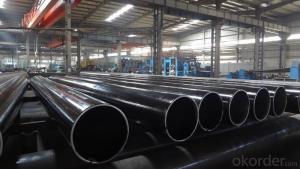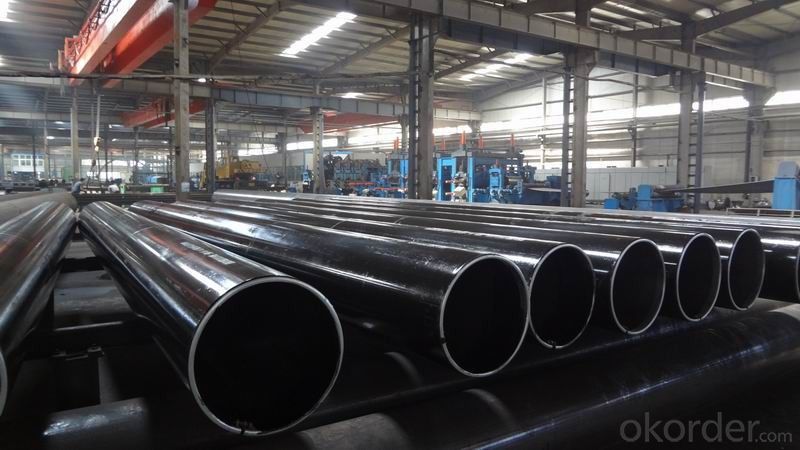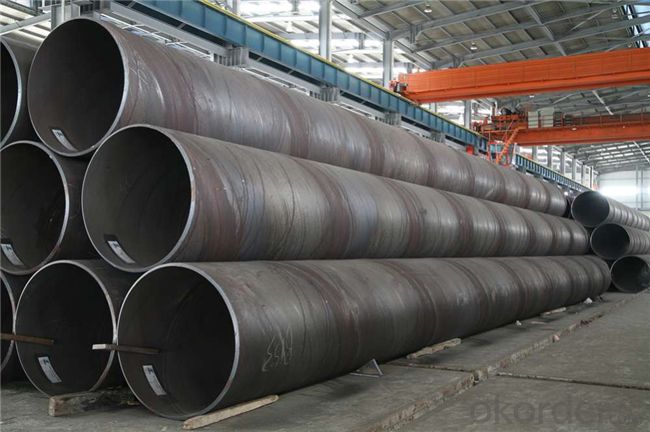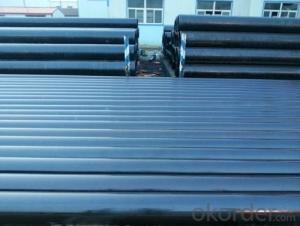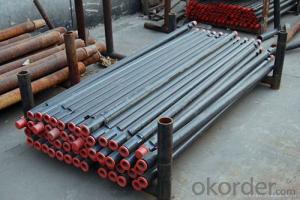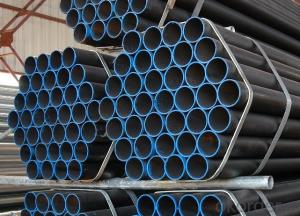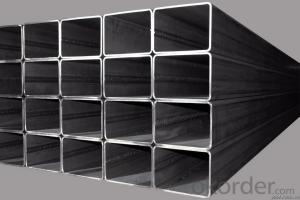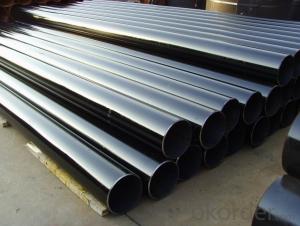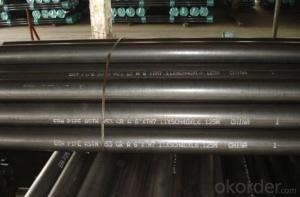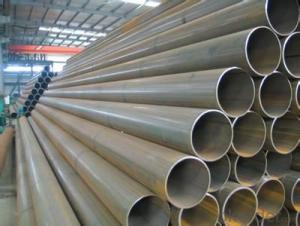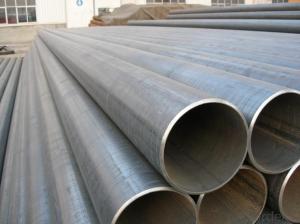ASME API 5L Good Quality ERW Steel Pipe Welding
- Loading Port:
- Tianjin
- Payment Terms:
- TT or LC
- Min Order Qty:
- 25 m.t.
- Supply Capability:
- 10000 m.t./month
OKorder Service Pledge
OKorder Financial Service
You Might Also Like
1、Structure of Welded Steel Tube:
We are company that have many years experience and professional manager team and engineer team and sales team, sure we will provide you high quality of pipe and professioanl service.Welded Steel Tube is formed by drawing a solid billet over a piercing rod to create the hollow shell. We are company that have many years experience and professional manager team and engineer team and sales team, sure we will provide you high quality of welded pipe and professioanl service.
2、Main Features of the Welded Steel Tube:
• High manufacturing accuracy
• The higher strength
• The small inertia resistance
• Strong heat dissipation ability
• Good visual effect
• Satisfy price
3、Welded Steel Tube Specification:
Standard | GB, DIN, ASTM ASTM A106-2006, ASTM A53-2007 |
Grade | 10#-45#, 16Mn 10#, 20#, 45#, 16Mn |
Thickness | 8 - 33 mm |
Section Shape | Round |
Outer Diameter | 133 - 219 mm |
Place of Origin | Shandong, China (Mainland) |
Secondary Or Not | Non-secondary |
Application | Hydraulic Pipe |
Technique | Cold Drawn |
Certification | API |
Surface Treatment | factory state or painted black |
Special Pipe | API Pipe |
Alloy Or Not | Non-alloy |
Length | 5-12M |
Outer Diameter | 21.3-610mm |
Grade | 20#, 45#, Q345, API J55, API K55, API L80, API N80, API P110, A53B |
Standard | ASME, ASTM |
1) Material:20#(ASTM A 106/A53 GRB.API5LGRB,GB),45#,16Mn,10#.
2) Specification range:OD:21.3-610mm,WT:6-70mm,length:6-12m or according to the requirement of clients.
3) Excutive standards:GB,ASME API5L.ASTM A 106/A53,Despite of the above standards,we can also supply seamless steel pipe with standard of DIN,JIS,and so on,and also develop new products according to the requirements of our clients!
4) Surface:black lacquered,varnish coating or galvanized.
5) Ends:Beveled or square cut,plastic capped,painted.
6) Packing:bundles wrapped with strong steel strip,seaworthy packing.
4、Packaging & Delivery
Packaging Details: | seaworthy package,bundles wrapped with strong steel strip |
Delivery Detail: | 15-30days after received 30%TT |
5、FAQ of Welded Steel Tube:
①How is the quality of your products?
Our products are strictly in accordance with international and domestic standard. We test on every pipe before delivery. Any quality certification or testing report you want to see, please tell us.
Guaranteed: If products’ quality is not in accordance with description as we provide or the promise before you place order, we promise 100% refund.
②How about the price?
Yes, we are factory and be capable of offering you the lowest price. One of our policy is that “ to save time and be absolutely honest with our business relationship, we quote as low as possible for every client, and discount can be given according to the quantity”, if you are interested in bargain and dissatisfy our factory price, just don’t waste your time. Our quotation is professional.
③Why should you choose us?
Choice happens because of our quality and price. Additionally, we can also offer professional products inquiry, products knowledge train (for agents), fast goods delivery, outstanding customer solution proposals. Our service formula: good quality + good price + good service=customer’s trust.
SGS test is available. Customer inspection before shipping is welcome. Third party inspection is OK.
6、 Welded Steel Tube Images:
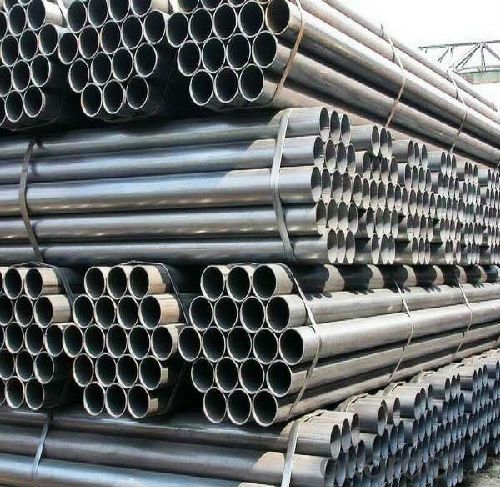
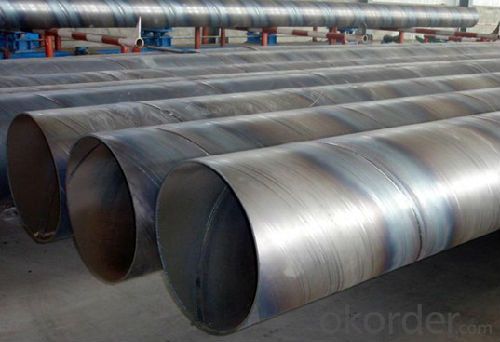
- Q: What are the different sizes of steel pipe nipples?
- The sizes of steel pipe nipples vary depending on their intended use and application. Common sizes include 1/8", 1/4", 3/8", 1/2", 3/4", 1", 1 1/4", 1 1/2", and 2". However, there are many other sizes available to cater to specific needs and requirements.
- Q: Can steel pipes be used for conveying food and beverages?
- No, steel pipes are not suitable for conveying food and beverages as they can corrode and contaminate the products.
- Q: How are steel pipes used in the agriculture sector?
- Steel pipes are commonly used in the agriculture sector for various purposes, such as irrigation systems, drainage systems, and structural support for farm buildings and infrastructure. They are also used for conveying water, chemicals, and other fluids, as well as for constructing fencing and livestock enclosures. Moreover, steel pipes are utilized in the construction of machinery and equipment essential for farming operations.
- Q: How are steel pipes used in the manufacturing of appliances?
- Steel pipes are commonly used in the manufacturing of appliances for various purposes such as transporting fluids, gases, and air within the appliance, providing structural support, and acting as conduits for electrical wiring. They are also used for creating ventilation systems and heat transfer mechanisms, ensuring efficient operation and durability of appliances.
- Q: What's the difference between steel pipe and pipe fittings?
- Pipe fittings: parts that connect pipes to pipes. According to the connection method can be divided into socket type pipe fittings, threaded fittings, flange pipe fittings and welding pipe fittings four kinds. Multipurpose; made of the same material as pipes. Elbow (elbow), flange, three pipe and four pipe (crosshead) and reducer (reducer) etc.. Elbow for pipeline corner; flange for the pipe and pipe interconnected parts, connected to the pipe end, three pipe for three pipe collection; four pipe for four tubes together place; for two pipes of different diameters connected to different diameter pipe.
- Q: Can steel pipes be used for culvert applications?
- Indeed, culvert applications can utilize steel pipes. The utilization of steel pipes for culverts is widespread owing to their exceptional endurance, robustness, and immunity to corrosion. They possess the capability to endure substantial burdens, accommodate extensive traffic flow, and manage large water surges. Furthermore, steel pipes can be effortlessly fabricated in diverse dimensions and configurations to cater to specific culvert prerequisites. Their prolonged lifespan and minimal upkeep demands render them a cost-efficient alternative for culvert applications.
- Q: What is the abrasion resistance of steel pipes?
- The abrasion resistance of steel pipes is high due to their hardness and durability, making them resistant to wear and tear caused by friction or rubbing against surfaces.
- Q: What's the difference between a rectangular tube and a rectangular steel tube?
- The classification of rectangular tube: steel pipe seamless steel pipe and welded steel pipe (tube) hot-rolled seamless tube, seamless tube, seamless tube, welded tube extrusion. The welded square pipe is divided into two parts:(a) according to the process of arc welding - resistance welding tube, square tube (high frequency and low frequency), welding square tube, welding square tube furnace (b) according to the weld - welded square tube, spiral welded pipe.
- Q: How are steel pipes used in the manufacturing of agricultural machinery and equipment?
- Steel pipes are commonly used in the manufacturing of agricultural machinery and equipment due to their strength, durability, and versatility. These pipes are used for various purposes such as forming the structural framework, creating hydraulic systems, and providing conduits for fluid and air transportation. Whether it's for building tractor chassis, constructing irrigation systems, or manufacturing grain storage equipment, steel pipes play a crucial role in ensuring the reliability and efficiency of agricultural machinery.
- Q: What is the difference between steel pipes and polyethylene pipes?
- Steel pipes are made of a strong and durable material, steel, which makes them suitable for high-pressure and high-temperature applications. They are also resistant to corrosion, making them ideal for transporting liquids and gases. On the other hand, polyethylene pipes are made of a flexible plastic material, which makes them easier to install and handle. They are lightweight, resistant to chemicals, and have a low risk of corrosion. However, they may not be suitable for very high-pressure or high-temperature applications.
Send your message to us
ASME API 5L Good Quality ERW Steel Pipe Welding
- Loading Port:
- Tianjin
- Payment Terms:
- TT or LC
- Min Order Qty:
- 25 m.t.
- Supply Capability:
- 10000 m.t./month
OKorder Service Pledge
OKorder Financial Service
Similar products
Hot products
Hot Searches
Related keywords
